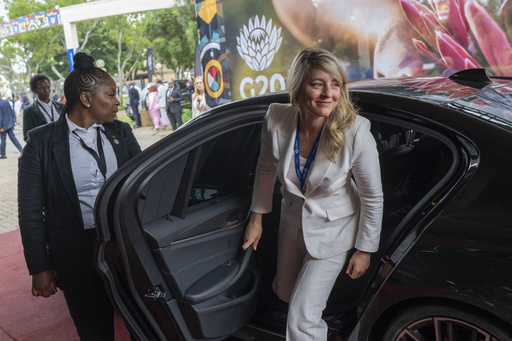JOHANNESBURG — During a recent G20 meeting in South Africa, U.K. Foreign Secretary David Lammy expressed skepticism about Russia’s willingness to engage in peace efforts concerning the conflict in Ukraine. His remarks followed a speech delivered by Russia’s Foreign Minister Sergey Lavrov to senior diplomats in a private session at the G20 foreign ministers meeting in Johannesburg.
Lammy conveyed to the press that his impressions from Lavrov’s address lacked any indication of a genuine desire for peace. He quoted Lavrov’s earlier comments, which criticized Western nations and accused them of meddling in the internal matters of various countries, asserting that there seemed to be no real inclination to achieve a peaceful resolution.
In a notable moment during the meeting, Lavrov reportedly exited the room just as Lammy was preparing to speak. The two-day G20 session, which commenced on Thursday, follows significant bilateral discussions between the United States and Russia aimed at finding a resolution to the ongoing war in Ukraine, talks that notably excluded U.S. allies in Europe and Ukraine.
U.S. President Donald Trump’s recent statements have further complicated the West’s stance, as he has publicly criticized Ukrainian President Volodymyr Zelenskyy while incorrectly attributing blame for the invasion directly to Ukraine. As the conflict marks its third anniversary next week, Lammy remarked that discussions have not advanced beyond preliminary talks. “At the moment, we’ve had talks effectively about talks. We’ve not got anywhere near a negotiated settlement,” he stated.
In his address, Lammy referred to Russia’s actions as representative of “Tsarist imperialism,” suggesting that mature nations learn from past colonial failures and conflicts. He emphasized his disappointment at not hearing any expressions of sympathy for the victims of aggression or any willingness to pursue a lasting peace. Instead, Lammy characterized Lavrov’s rhetoric as “the logic of imperialism dressed up as a realpolitik” and dismissed Lavrov’s statements as “tired fabrications.”
The atmosphere at the G20 was tense, highlighted by the cancellation of a photo opportunity for the foreign ministers without any explanation. The United Kingdom, France, Germany, and the EU reaffirmed their commitment to support Ukraine during the discussions. Notably absent from the gathering was U.S. Secretary of State Marco Rubio, who opted out amid ongoing tensions with South Africa over its policies, which the Trump administration has labeled anti-American. Instead, the U.S. was represented by Dana Brown, its acting ambassador to South Africa.
The G20 represents 19 of the world’s largest economies, along with the European Union and the African Union. Attendees included notable figures such as EU foreign policy chief Kaja Kallas, Chinese Foreign Minister Wang Yi, and France’s Foreign Minister Jean-Noël Barrot, who reiterated France’s condemnation of Russia through various media outlets.
Following his discussions with Wang, Lavrov remarked that Russia’s relationship with China plays a crucial role in stabilizing global dynamics and preventing the escalation of conflict. The G20 is designed to unite developed and developing nations to encourage international cooperation, yet it frequently struggles to achieve consensus due to conflicting interests among the U.S., Europe, Russia, and China, a challenge exacerbated by Russia’s invasion of Ukraine last year.
As South Africa presides over this year’s G20 discussions, President Cyril Ramaphosa opened the meeting by stressing the necessity for “serious dialogue” amid ongoing geopolitical tensions, climate change, pandemics, and food insecurity challenges. He highlighted that consensus among major powers within the G20 is lacking regarding solutions to these pressing issues.
Rubio’s choice to boycott, along with his intention to also skip the main G20 summit later this year, raises concerns about the G20’s functionality. U.S. Treasury Secretary Scott Bessent also announced he would not attend the upcoming G20 finance ministers’ meeting due to obligations in Washington, signifying yet another indication of Trump’s approach favoring “America First” policies over international collaboration.
